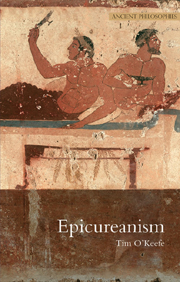Book contents
- Frontmatter
- Contents
- Preface
- Acknowledgements
- Sources and abbreviations
- Chronology
- 1 Introduction: the life of Epicurus and the history of Epicureanism
- I Metaphysics and physics: introduction and overview
- II Epistemology: introduction and overview
- III Ethics: introduction and overview
- 11 Pleasure, the highest good
- 12 Varieties of pleasure, varieties of desire
- 13 The virtues and philosophy
- 14 Justice
- 15 Friendship
- 16 The gods
- 17 Death
- Glossary of terms
- Notes
- Further reading
- Bibliography
- Index
16 - The gods
from III - Ethics: introduction and overview
- Frontmatter
- Contents
- Preface
- Acknowledgements
- Sources and abbreviations
- Chronology
- 1 Introduction: the life of Epicurus and the history of Epicureanism
- I Metaphysics and physics: introduction and overview
- II Epistemology: introduction and overview
- III Ethics: introduction and overview
- 11 Pleasure, the highest good
- 12 Varieties of pleasure, varieties of desire
- 13 The virtues and philosophy
- 14 Justice
- 15 Friendship
- 16 The gods
- 17 Death
- Glossary of terms
- Notes
- Further reading
- Bibliography
- Index
Summary
A central goal of Epicurean physics is to banish the fear of the gods, because that fear is one of the chief impediments to attaining happiness. We have already looked (in Chapter 5) at the negative side of Epicurean theology. The workings of the cosmos can be explained entirely in terms of the purposeless motions, reboundings and entanglements of atoms moving through the void, and so there is no reason to attribute them to the gods (DRN V 1161–1225). Furthermore, the manifest flaws in the world show that it is not under the control of philanthropic deities, and the random ways in which phenomena such as lightning bolts occur show that they are not the result of any sort of agency, even the jealous and flawed agency of the Olympian gods.
Since the Epicureans eject the gods from the world, denying that they have any influence whatsoever on it, it is understandable that “Epicurean” became a byword for “atheist” in antiquity. (In fact, a Hebrew word for an unbelieving heretic, an apikoros, is derived from “Epicurean”.) But the Epicureans vigorously rebut this accusation. Epicurus pointedly calls some of the prominent atheists of his time crazy, comparing them to people in a Bacchic frenzy (Phld. Piet. 112.5–12, LS 23H). He says that the knowledge that there are gods is enargēs, evident or obvious. Enargēs is the same term he uses to label obvious and evident phenomena such as there being bodies in motion, phenomena on the basis of which we make inferences about what is hidden, the adēlon.
- Type
- Chapter
- Information
- Epicureanism , pp. 155 - 162Publisher: Acumen PublishingPrint publication year: 2009



